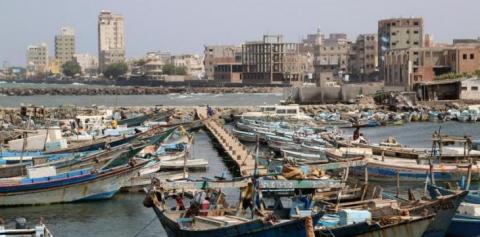Feature: Deadly cholera hits illegal immigrants in Yemen amid worsening health situation


Officials of Yemen's health authorities said an outbreak of cholera has killed 21 illegal African immigrants and asylum-seekers, and infected over 450 others in the government-controlled southern province of Lahj.
The deadly epidemic was first reported in one detention center of the illegal African immigrants seized by the Yemeni security authorities and started spreading rapidly to other overcrowded centers in the country's southern provinces, particularly in Lahj.
Yemeni security authorities launched a large detention campaign several weeks ago and succeeded in gathering about 4,700 illegal immigrants at a sports stadium in the southern port city of Aden.
The illegal immigrants arrived in the war-ravaged Arab country seeking for new safe lives but unexpectedly faced miserable living conditions, and began struggling again to survive deadly cholera, a preventable water-borne bacterial illness that causes severe diarrhea, vomiting and dehydration.
According to officials of the local government in Lahj, more cholera patients are being registered among the illegal African immigrants at a rate of 10 every day amid poor health service and lack of medicines in the country suffering from years-long military conflict.
The Yemeni government officials warned that the southern provinces could see cholera outbreak out of control.
Awadh Ban Awadh Alsalahi, deputy governor of Lahj province, told Xinhua in an exclusive interview that the intervention from the international humanitarian organizations in order to deal with the recent health crisis is still absent.
"The recent situation of the cholera-infected immigrants is very tragic. We as officials of Lahj local authority call on all the international humanitarian organizations to take urgent actions and send medical help immediately," Alsalahi said.
He said that the Lahj's health department continues providing support and treating patients, but the situation aggravated dramatically and needs immediate aids to establish a new well-equipped medical center.
Some illegal African immigrants revealed the reasons that led to the deadly cholera outbreak among, saying that hunger forced them to seek for contaminated food and unclean water after their long journey into Yemen.
One of the Ethiopian immigrants named as Ahmed Atof told Xinhua that "we traveled from our country in a good health condition but spent around 10 days having unclean water and food that caused this disease."
Another illegal African immigrant identified himself as Ali Sahel urged all the international humanitarian agencies to help them in getting back to their country after harsh living conditions and diseases led to the deaths of his friends in Yemen.
"We left our countries and tried to reach Saudi Arabia but unfortunately Yemen's authorities detained us. Our suffering is exacerbating day by day and we call everyone to help us get back home," Sahel said with tears.
Ayman Raweh, head of a department at Ibn Khaldoon public hospital in Lahj province, complained that the city's health teams are facing a serious problem in accommodating a large number of cholera-infected immigrants.
"The diarrhoeal diseases department at Ibn Kholdoon public hospital barely accommodate 30 cases in normal days but now it's overcrowded and received about 450 cases of illegal African immigrants infected with cholera," said Raweh.
"Some of the patients are quickly losing their fluids through vomiting and watery diarrhea that killed 21 of them during the previous days," he added.
Statistics show more than 36,000 African migrants arrived in Yemen during the first three months of 2019.
Thousands of African illegal immigrants looking for a better life were using Yemen as a transit point to their final destination, Saudi Arabia or other Gulf states.
Notably, scores of illegal immigrants from Somalia and Ethiopia have died off the coast of Yemen in recent months.
Yemen has been plagued in a civil war between the government forces and Houthi rebels since late 2014, which has killed tens of thousands of people, mostly civilians.
The long-running conflict has caused the world's worst humanitarian crisis. Currently, some 24 million Yemenis, or 80 percent of the total population, need humanitarian aid and protection, according to the United Nations.
AFP.

Aden — Yemen Airways has announced new updates to its ticket cancellation (VOID) policy, introducing financial penalties on travel agents in…

Geneva – The United States announced that Yemen will not be among the countries benefiting from a new $2 billion funding pledge for United Na…

Paris — The French humanitarian organization Acted announced that it has delivered cash assistance to nearly 89,000 people affected by displa…